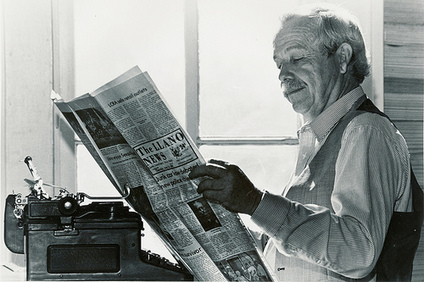The Power of Consuming Good News
by Jordan Myska Allen, a lover of life and entrepreneur. He acts as a psychological, spiritual, and professional consultant and practices applied integral thinking.
I propose that we live in the most loving, compassionate, and aware time in the history of humanity. I believe that the average person is far better off right now than the average person was even a very short time ago, even looking at objective things that almost everyone values—such as lifespan, health, and capacity for self-determination in most aspects of our lives.
Furthermore, I believe that we’re continuing to improve, to better ourselves and the world around us. And I believe I can prove it to you right now.
“Why then, Jordan,” you may ask, “Is there so much bad news? All the time I hear about shootings, terrorism, threats of nuclear annihilation. How can you say it’s better when that stuff didn’t happen in the past?”
There’s problem #1: That stuff did happen in the past. We just weren’t as aware of it. We couldn’t get the news from around the country (much less the globe) with nearly as much speed, and frankly, most people didn’t care.
Problem #2: There is a lot of bad news; I’m not trying to deny reality. There’s just a lot more good news, but it’s not thrown in our faces. You’re already on DailyHap.com, so you’re off to a good start. What would your life be life if you watched a TED talk (ted.com) every evening instead of the nightly news? What if you got one email a day giving you legitimately good news (albeit slightly liberal leaning good.is) about creative new entrepreneurial ideas, non-profits, inventions, and projects?
A lot of the good “news” is hard to find because it’s not news in the traditional sense. It’s updates from local organizations doing amazing, long-term leadership and development work like Austin’s African Leadership Bridge (africanleadershipbridge.org), or a weekly email from Integral Life (integrallife.com), Partners in Health (pih.org) or Kiva (kiva.org). There’s plenty of good news in print too; newsletters loaded with inspiring stories from the organizations like FINCA, Medecins Sans Frontiers, and World Hope keep each other company on the top of my toilet tank.
Good things take a long time to develop, whereas bad things happen in a moment. It’s much more exciting to report that a person was shot in Chicago, than to report that 2,707,119 people weren’t shot. Sometimes good news takes a really long time, like this article about a history of women’s spiritual uprisings or the progress made towards a world-wide renewable energy grid (geni.org). Or the news has been around for a long time like the Carnegie Hero Fund, (carnegiehero.org/about-the-fund) which recently had to make the requirements more stringent because too many people qualified as heroes—humans who’d put themselves in mortal danger to rescue or help a stranger with no personal incentive.
We already consume a lot of good news, but it’s not a part of our mainstream cultural conversation. My challenge to us all is to highlight these news sources, and bring them into our daily conversations. I believe you’ll be pleasantly surprised as others start sending you articles, videos, and other bits of good news.
Forget debating which news network is more balanced; they’re all unbalanced towards drama. Consume good news. Positive stories of all the incredible things happening everyday.
Other cool sources:
- Medium, medium.com, designed by the creators of Twitter (and Blogger) to “share ideas and experiences that move humanity forward?”
- Kickstarter, kickstarter.com, Creative start-ups like the metal that keeps coffee at the perfect temperature for hoursor the guy who wants to help people make things?
- Big Think, bigthink.com, SoulPancake, soulpancake.com, and Quora, quora.com—thought-provoking discussions
- Shareable, shareable.net, Constant updates on how there’s more collaboration between people than ever before.

